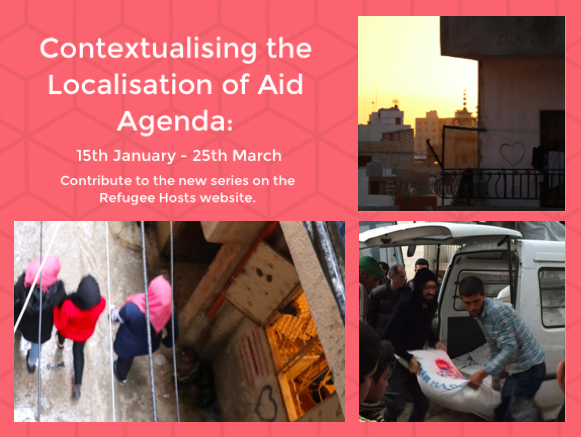
Call for Submissions: Contextualising the Localisation of Aid Agenda (January 15th-March 25th)
This call for submissions invites contributions that add to on-going debates about the ‘localisation of aid agenda’, encouraging in particular pieces that help to conceptualise and contextualise ‘the local’ in the context of responses to displacement in the global South:
- How is ‘the local’ understood and engaged with in responses to conflict-induced displacement? Neighbourhoods? Municipalities? Nations? Geopolitical regions? What is the relationship between these different ‘scales’ of response?
- How are local responses conceptualised, activated, negotiated or resisted by people affected by displacement?
- What conceptual, political, policy, pragmatic and ethical challenges and opportunities exist in relation to the ‘localisation agenda’?
- What are the roles of history and geography in understanding, implementing and/or critiquing the ‘localisation of aid’ agenda?
- Which local actors are supported and viewed as ‘good partners’, and which local actors are viewed with suspicion? Why, by whom, and with what effect?
- How are conceptualisations of ‘the local’ framed by assumptions and beliefs about religion and gender (amongst other factors)?
- What roles can interdisciplinary research methods – from and beyond the Arts and Humanities, the Social and Political Sciences, and Architecture, Planning and Design – play in informing academic, policy and practitioner engagements with local communities.
We invite contributions in the form of short pieces drawing on original research, creative pieces including poems, soundscapes and artwork, photo essays or reflections from the field. In exploring these questions as part of this series, the Refugee Hosts team is keen to explore the ways that interdisciplinary methods can help us better understand the local, both in policy discussions and in academic and public debates.
Local communities and the localisation of aid agenda
In recent years, and especially since the 2016 World Humanitarian Summit, the ‘localisation of aid agenda’ has become prominent in many discussions about and responses to displacement. This agenda starts by recognising that ‘local actors’ play key roles in responding to displacement and other humanitarian situations; it subsequently aims to shift resources from ‘international actors’ – including UN agencies, donor states, and international NGOs – to ‘local actors’ and to develop modes of partnership and co-working that go beyond ‘subcontracting’ local actors to work on ‘international’ programmes. The ‘localisation of aid agenda’ therefore attempts to bring local-level responses to displacement into the nexus of international humanitarianism by developing policies and strategies that effectively engage with local actors.
However, in practice, the ‘localisation of aid agenda’ often equates ‘the local’ with ‘the national’ (the state level) and/or the ‘sub-national’ (including on municipal levels), leading to questions such as: ‘what’ or ‘who’ is the local; ‘where’ is the local; and how are different local actors (including local communities implicitly or explicitly motivated by faith) perceived and engaged with by national, regional and international actors. These questions are at the core of our Refugee Hosts research project, and also to our new blog series.
Local people and communities are often, if not always, the first providers of assistance in contexts of displacement. These include not only ‘host communities’ composed of local citizens, but also refugees and displaced peoples, who, whilst typically represented by humanitarian narratives as passive victims, are increasingly recognised as key providers of aid; this includes processes that Refugee Hosts PI Dr Elena Fiddian-Qasmiyeh refers to as ‘refugee-refugee humanitarianism’.
The Refugee Hosts research project aims to contribute to the ‘localisation agenda’ by developing a better understanding of the roles and motivations of local hosting communities in Lebanon, Jordan and Turkey. However, for this contribution to be meaningful and effective, we also believe it is vital to critically investigate the ways in which ‘the local’ is conceptualised by Northern humanitarian organisations and practitioners.
As such, and in drawing on Elena Fiddian-Qasmiyeh’s work relating to South-South humanitarianism, we also believe it is vital for knowledge about local responses to displacement to be formed co-productively so that perceptions and assumptions are challenged (and potentially changed). The aim here is to also ensure that the localisation agenda can be carefully contextualised, taking note of the diverse histories, cultures, religions, geographies and epistemologies that frame local-level humanitarian responses to displacement, and the challenges and opportunities that the ‘localisation agenda’ presents.
How to submit
Submissions must be a maximum of 900 words and written in a way that is accessible to a wide audience. Pieces must reference using hyperlinks only: our online contributions do not use footnotes or other forms of referencing such as Harvard style referencing. Where necessary, a bibliography can also be included containing the list of sources used.
Submissions are welcome on a rolling basis. Please send your submission, along with a short biography of no more than 100 words, to the Refugee Hosts Project and Communications Coordinator Aydan Greatrick on aydan.greatrick.15@ucl.ac.uk.
We also welcome submissions that touch on other aspects of this project and which contribute to our broader community of conversation. As such, we also invite you to look at our open call for submissions as well as our other series, including Representations of Displacement, Translation, Poetry and Displacement and Faith and Displacement. Please email Aydan Greatrick to discuss possible ideas for a general submission.
Featured images in collage from left to right: Young women walking through Baddawi refugee camp. (c) E. Fiddian-Qasmiyeh. Jan. 2017, Aid is delivered and distributed in Turkey (c) Avicenna Hilfswerk e.V., The Masjid al-Quds mosque overlooks the cemetery in Baddawi refugee camp (c) E. Fiddian-Qasmiyeh. July 2016.

7 comments